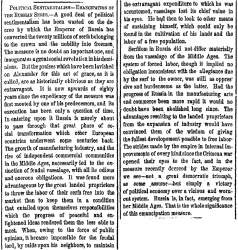Record Data
Transcription
POLITICAL SENTIMENTALISM - EMANCIPATION OF THE RUSSIAN SERFS. – A good deal of political sentimentalism has been wasted on the decree by which the Emperor of Russia has converted the twenty millions of serfs belonging to the crown and the nobility into freemen. The measure is no doubt an important one, and inaugurates a great social revolution in his dominions. But the praises which have been lavished on Alexander for this act of grace, as it is called, are as historically oblivious as they are extravagant. It is now upwards of eighty years since the expediency of the measure was first mooted by one of his predecessors, and its execution has been only a question of time. In entering upon it Russia is merely about to pass through that great phase of social transformation which other European countries underwent some centuries back. The growth of manufacturing industry, and the rise of independent commercial communities in the Middle Ages, necessarily led to the extinction of feudal vassalage, with all its odious and onerous obligations. It was found more advantageous by the great landed proprietors to throw the labor of their serfs free into the market than to keep them in a condition that entailed upon themselves responsibilities which the progress of peaceful and enlightened ideas rendered them the less able to meet. When, owing to the force of public opinion, it became impossible for the feudal lord, by raids upon his neighbors, to maintain the extravagant expenditure to which he was accustomed, vassalage lost its chief value in his eyes. He had then to look to other means of sustaining himself, which could only be found in the cultivation of his lands and the labor of a free population.
Serfdom in Russia did not differ materially from the vassalage of the Middle Ages. The system of forced labor, though it implied no obligation inconsistent with the allegiance due by the serfs to the owner, was still as oppressive and burdensome as the latter. Had the progress of Russia in the manufacturing arts and commerce been more rapid it would no doubt have been abolished long since. The advantages resulting to the landed proprietors from the expansion of industry would have convinced them of the wisdom of giving the fullest development possible to free labor. The strides made by the empire in internal improvements of every kind since the Crimean war opened their eyes to the fact, and in the measure recently decreed by the Emperor we see – not a great democratic triumph, as some assume – but simply a victory of political economy over a vicious and worn-out system. Russia is, in fact, emerging from her Middle Ages. That is the whole significance of this emancipation measure.


